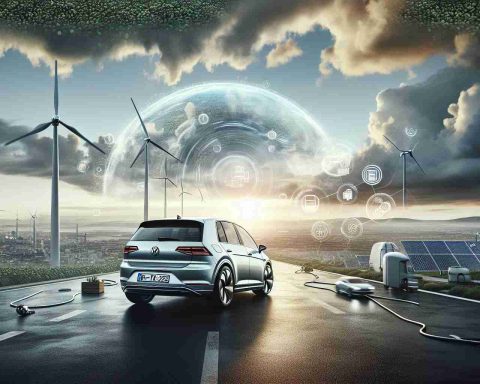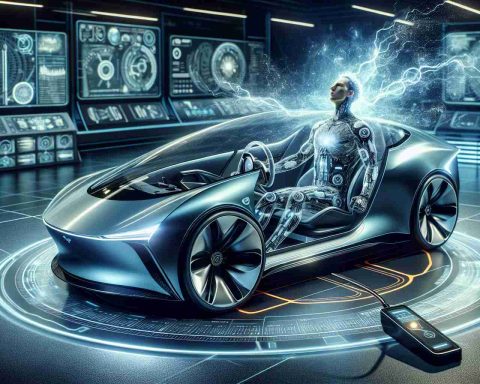- Volkswagen unveiled a low-cost electric vehicle, priced at 20,000 euros, aiming for a 2025 release.
- The company faced rocky times in late 2024, addressing cost challenges without closing domestic factories.
- A significant reduction of 35,000 jobs was announced, impacting production by 730,000 units by 2030.
- Economic challenges in Germany and falling sales in China strained Volkswagen’s profitability.
- The upcoming ID.2all, anticipated in 2026, highlights Volkswagen’s commitment to affordable electric vehicles.
- Wolfsburg is poised to be a global production hub, instrumental in Volkswagen’s shift towards electric innovation.
- The strategy to democratize electric vehicles marks a significant pivot, reinforcing Volkswagen’s role in technological advancement.
A buzz swept through Volkswagen’s headquarters in Wolfsburg this February as the company unveiled its latest electric marvel: an entry-level electric vehicle set to make waves in 2025. The car’s affordable 20,000-euro price tag stands as a beacon for consumers eager to embrace the electric shift without breaking the bank.
But beneath the shine of this unveiling lies a tale of resilience. In the fall of 2024, Volkswagen faced turbulent times. The company stood at a crossroads, grappling with severe cost-cutting measures, including workforce reductions and potential factory closures. However, spirited negotiations led to a pivotal decision—domestic factory closures were avoided, though a dramatic reduction of 35,000 jobs by 2030 was confirmed, reshaping the production capacity by a significant 730,000 units.
The challenges for Volkswagen did not arise in a vacuum. Germany’s economic turmoil, marked by inflation and astronomical energy costs, hit the company hard. Volkswagen, heavily reliant on domestic operations, felt the squeeze as the profitability of its factories dwindled. Adding to its woes, sales plummeted in the crucial Chinese market, reaching precarious lows.
Amidst this backdrop, the anticipation of the ID.2all, a compact electric vehicle set to launch in 2026, glimmers with promise. As Volkswagen leans into electric innovation, Wolfsburg emerges as its central hub, tasked with setting new global production standards.
Volkswagen’s gamble on accessible electric vehicles underscores a strategic pivot—one that seeks to democratize the electric experience, making it inclusive and engaging for all. The move not only promises a leap in sales but marks a new chapter in automotive ingenuity, ensuring that the brand remains a vanguard of technological advancement in an era racing toward an electric future.
Volkswagen’s Bold Electric Pivot: What You Need to Know
Introduction
Volkswagen’s ambitious entry into the electric vehicle (EV) market, with plans for an affordable electric car set to debut in 2025, is generating significant anticipation. This effort is part of their strategic pivot to remain a leading player in an industry increasingly defined by sustainable transportation solutions. Below, we explore various aspects of this development that were not fully covered in the original article.
1. Real-World Use Cases
Electric vehicles (EVs) like Volkswagen’s upcoming entry-level model are transformative for urban environments, where zero emissions and reduced noise pollution are key priorities. Ideal for city commutes and short trips, these vehicles offer convenient charging solutions at home or public stations.
2. Market Forecasts & Industry Trends
The global electric vehicle market is projected to grow at a CAGR of over 20% from 2023 to 2030, driven by continuing advancements in battery technology, government incentives, and increasing environmental awareness. Volkswagen aims to capture a significant share by introducing competitively priced EVs.
3. Features, Specs & Pricing
While specific features of the new Volkswagen EV have not been fully disclosed, reports indicate it will likely include a range of around 250-300 km per charge, basic autonomous driving capabilities, and advanced infotainment systems. The starting price of around 20,000 euros positions it competitively against peers in the budget EV segment.
4. Controversies & Limitations
Volkswagen’s workforce reduction, set to cut 35,000 jobs by 2030, highlights a controversial aspect of their EV shift; while it reduces costs, it raises significant social and ethical questions. Additionally, tackling supply chain issues and battery sourcing within an evolving geopolitical landscape remains a challenge.
5. Security & Sustainability
Volkswagen invests heavily in developing sustainable battery technologies, ensuring their sourcing practices adhere to responsible mining standards. With increasingly rigorous cybersecurity measures in place, Volkswagen also aims to protect customer data and vehicle systems from cyber threats.
6. Reviews & Comparisons
As more information becomes available, VW’s new model will be compared against rivals such as Tesla’s Model 2 and Renault’s electric city car offerings. Key factors will include range, price, feature set, and brand perception among environmentally conscious consumers.
7. Tutorials & Compatibility
The 2026 launch of the ID.2all showcases VW’s dedication to user-friendly designs, with a focus on intuitive EV technology interfaces. Tutorials will be available both online and through VW dealerships to assist new EV owners.
Conclusion: Actionable Recommendations
For consumers considering an electric vehicle, Volkswagen’s upcoming model promises to blend affordability with modern electric vehicle technology. Keep an eye on evolving underwriting programs and incentives aimed at reducing the financial barriers to EV ownership.
Quick Tips
1. Stay Informed: Keep abreast of new model announcements and reviews by following automotive and EV-specific news sites.
2. Explore Incentives: Investigate local and state government incentives for EV purchases, which can significantly reduce overall costs.
3. Test Drive: Once released, take advantage of test drives to familiarize yourself with the vehicle’s capabilities and features.
4. Charging Infrastructure: Consider the availability and convenience of charging options near your home and workplace.
For more insights into Volkswagen and its electric ambitions, visit the Volkswagen official site.
















